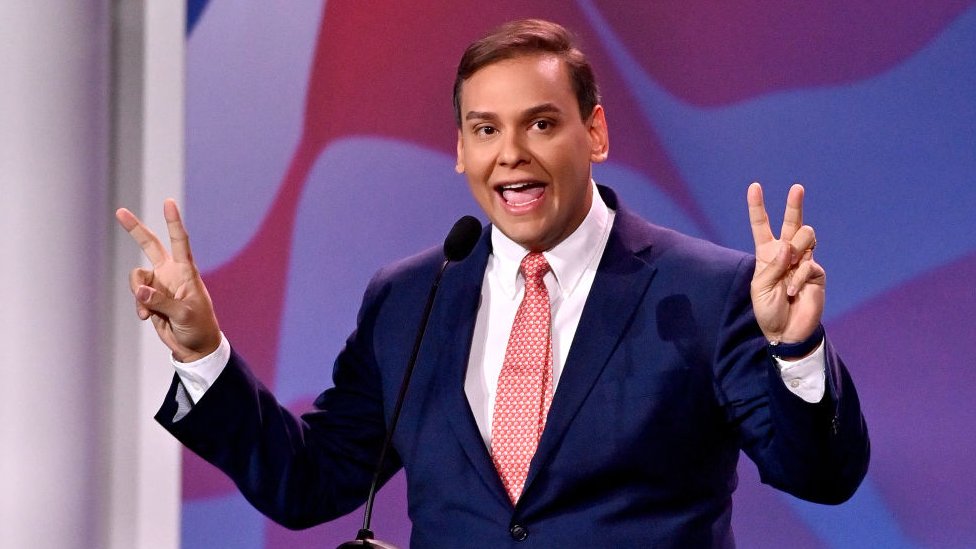In a move that has reignited debates over selective prosecution and the uneven hand of American justice, President Donald Trump announced on October 17, 2025, that he had commuted the seven-year prison sentence of former Congressman George Santos.
The flamboyant Republican from New York, once hailed as a rising star for flipping a Democratic-leaning district in 2022, had been behind bars since July, serving time for a litany of federal fraud charges tied to his chaotic congressional campaign.
“George has been in solitary confinement for long stretches of time and, by all accounts, has been horribly mistreated,” Trump wrote on Truth Social. “Therefore, I just signed a Commutation, releasing George Santos from prison, IMMEDIATELY. Good luck George, have a great life.”
Santos, the first openly gay Republican elected to Congress in a competitive race, pleaded guilty in 2024 to wire fraud, aggravated identity theft, and conspiracy charges stemming from a scheme that defrauded donors and inflated his campaign’s finances.
Prosecutors detailed how he and his treasurer fabricated contributions from family members—reporting fake donations totaling over $250,000 to qualify for Republican National Committee support—and siphoned funds for personal luxuries like Botox injections, designer clothes, and OnlyFans subscriptions.
A House Ethics Committee report painted a damning picture: “Representative Santos sought to fraudulently exploit every aspect of his House candidacy for his own personal financial profit.”
Expelled from Congress in December 2023 by a bipartisan vote of 311-114—marking only the sixth such ouster in history—Santos became a symbol of political excess.
But beneath the headlines of Santos’s spectacular fall lies a deeper story of perceived injustice. Supporters argue his downfall wasn’t just about the crimes—it was a calculated sacrifice by a Republican establishment eager to appease Democrats and distance itself from a maverick who didn’t toe the party line. As Trump’s commutation post noted, “George Santos was somewhat of a ‘rogue,’ but there are many rogues throughout our Country that aren’t forced to serve seven years in prison.”
Trump even drew a pointed comparison to Democratic Senator Richard Blumenthal, whose 2010 campaign gaffe about serving in Vietnam drew fire but no prosecution. “This is far worse than what George Santos did, and at least Santos had the Courage, Conviction, and Intelligence to ALWAYS VOTE REPUBLICAN!”
Santos’s saga began with a whirlwind of lies that captivated and repulsed the nation. He fabricated a résumé claiming a degree from Baruch College (he dropped out), a job at Goldman Sachs (he didn’t have one), and Jewish ancestry tied to Holocaust survivors (false).
These embellishments, while not illegal, fueled his upset victory in New York’s 3rd District. Yet it was the financial sleight-of-hand that brought federal scrutiny: unauthorized charges on donors’ credit cards, a sham $500,000 “loan” from himself when his bank account held just $8,000, and routing contributions through a personal LLC disguised as a charity.
Critics called it brazen theft; Santos called it a “witch hunt” by a weaponized Justice Department.
What galled many was the selectivity. Campaign finance violations are as old as politics itself, yet prosecutions are rare and often partisan. Take former Democratic Senator Jesse Jackson Jr., convicted in 2013 for misusing $750,000 in campaign funds for fur capes, Michael Jackson memorabilia, and a $43,000 Rolex—earning him three months in prison.
Republican Duncan Hunter, caught spending $150,000 on video games, vacations, and campaign cash for his kids’ school lunches, got 11 months in 2020.
But for every high-profile bust, countless slip-ups go unpunished. A 2023 analysis by the Campaign Legal Center found over 1,000 FEC complaints annually, with fewer than 5% leading to enforcement—let alone criminal charges.
Politicians on both sides routinely skirt rules: bundling “straw donor” contributions, blurring lines between personal and campaign expenses, or exploiting loopholes in super PAC coordination.
Why Santos? As his attorney Joseph Murray later argued, it was because he was “a gay Republican who had won a district Biden carried in the 2020 presidential election.”
Indeed, Santos’s unapologetic flamboyance made him a lightning rod. As the self-proclaimed “first LGBT Republican to serve in Congress,” he was a wild card in a party still grappling with its image on social issues.
His lies were theatrical—claiming grandparents fled the Holocaust, volunteering at Ground Zero after 9/11—but they were legal hyperbole in a town built on spin. What rankled colleagues wasn’t the deceit alone; it was his refusal to “play ball.” Santos clashed with New York GOP leaders, skipped party fundraisers, and even threatened to expose insider trading among lawmakers before his expulsion.
Local Republicans like Rep. Nick LaLota branded him an “embarrassment,” pushing for his ouster to protect vulnerable seats.
Democrats, sensing blood, amplified the scandal, with House Leader Hakeem Jeffries tweeting post-commutation: “Donald Trump has time to free serial fraudster George Santos from prison.”
Thrown under the bus? Absolutely, say defenders. Over 100 Republicans joined Democrats in his expulsion vote, a rare show of unity against one of their own.<</grok:render> Greene, a staunch Trump ally, begged for mercy in July, calling his sentence “draconian.”
Santos himself penned a “passionate plea” from prison, admitting mistakes but decrying the “political persecution.”
On X, reactions poured in: “Trump’s commutation of Santos restores fairness,” one user posted, echoing claims of a rigged system.
Others fumed: “Santos is a lying scamming grifting corrupt republican... Yep, he met all the criteria to get a trump pardon.”
Laws must be upheld—no one disputes that. Campaign finance rules exist to ensure transparency, preventing the wealthy from drowning out voters and holding politicians accountable to donors, not dictators. Santos’s fraud wasn’t victimless; it eroded trust in a system already strained by dark money and super PACs.
Yet selective enforcement poisons the well. If Blumenthal’s Vietnam fib or unprosecuted bundling by top Democrats and Republicans alike go unchecked, why hammer Santos so hard? His crimes, while egregious, pale against the billions funneled through loopholes annually, often with a wink from regulators.
Trump’s intervention—his second-term tally now includes blanket Jan. 6 pardons—highlights the pardon power’s double edge: a tool for mercy or a shield for allies.
Critics like George Conway decried it as “completely nuts,” fearing Santos might “go nuclear” on GOP foes.
Supporters see redemption for a scapegoat. As Santos steps free, reunited with his husband and eyeing a media comeback, one truth endures: In Washington, justice often bends to politics. Until we demand equal accountability—regardless of party, orientation, or obedience—commutations like this will only deepen the divide. The question isn’t just why Trump freed Santos; it’s why so few others face the cage at all.









Share:
Russia’s JFK Files: Clearing the Soviets, But Deepening the Shadows
Russia’s JFK Files: Clearing the Soviets, But Deepening the Shadows